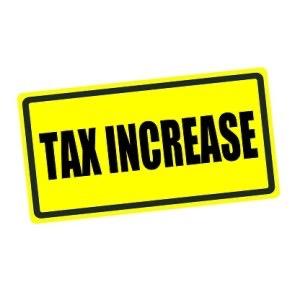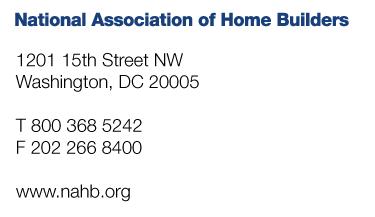
5 minute read
NAHB Now: NAHB Opposes House Democrats’ Plan for $2 Trillion in New Taxes
NAHB OPPOSES
House Democrats' Plan for $2 Trillion in New Taxes
NAHB is sounding the alarm to lawmakers as House Democrats within the Ways and Means Committee begin consideration of a massive overhaul of the tax code which would generate over $2 trillion in additional tax revenue over the next 10 years.
While the legislation also includes critical and much-needed affordable housing investments, this is far outweighed by trillions of dollars in job-killing tax hikes — which risk broad harm to the still fragile economy — along with direct and indirect cost increases on housing.
These changes are being considered to fund part of the Democrats ambitious Build Back Better plan, which focuses on what the White House refers to as “human infrastructure.”
The most concerning tax changes in the plan would: • Increase the marginal tax rates on individuals as well as corporations; • Reduce 1202 gains for certain small business investors; • Increase the capital gains rate; • Expand the application of the Net Investment Income Tax to active income; • Limit 199A deductions; • Alter the estate tax that may affect family-owned businesses; and • Otherwise limit business losses.
Many of these tax hikes will inevitably be passed along to new home buyers and renters and will result in a reduction of home building activity at a time when greater supply is urgently needed.
NAHB is fully engaged with Congress and working to blunt or roll back these proposed tax increases. If the Democrats remain unified, the procedural process being used by the Democrats allows them to move forward without Republican support, avoiding the filibuster in the Senate. This process has been used various times by both parties to enact many policy priorities, including by Republicans to enact tax reform in 2017 and Democrats to overhaul the health care system in 2010.

September 13, 2021
The Honorable Richard Neal Chairman Committee on Ways and Means 1102 Longworth HOB Washington, DC 20515
Dear Chairman Neal:
On behalf of the more than 140,000 members of the National Association of Home Builders (NAHB), I am writing in opposition to the Build Back Better Act proposals to be considered by the Ways and Means Committee this week. While the legislation includes critical and much needed affordable housing investments, this is far outweighed by trillions of dollars in job killing tax hikes—which risk broad harm to the still fragile economy—along with direct and indirect cost increases on housing.
The vast majority of NAHB’s members are organized as pass-through businesses, and the collective effect of the proposed tax increases on our members is alarming. Among the most concerning are the increases of the marginal tax rates on individuals as well as corporations; eliminating 1202 gains for certain small business investors; increasing the capital gains rate; expanding the application of the Net Investment Income Tax to active income; limiting 199A deductions; making changes to the estate tax that may affect family-owned businesses; and otherwise limiting business losses. Many of these tax hikes will inevitably be passed along to new home buyers and renters and will result in a reduction of home building activity at a time when greater supply is urgently needed. The committee should carefully consider how these tax hikes may exacerbate the ongoing housing affordability crisis facing the United States.
NAHB strongly supports many of the Low-Income Housing Tax Credit (LIHTC) provisions included in this package. The LIHTC is the most successful program to produce and preserve affordable rental housing in the country’s history, but it has historically lacked the resources to meet the overwhelming need for affordable rental housing. This bill takes meaningful steps to provide the program with the funding it needs. However, we remain concerned by retroactive tax changes to qualified contracts. We firmly believe that a fundamental principle of the program’s past and future success is the public-private partnership model, which depends on a mutual understanding that Congress will not retroactively alter the rules.
NAHB also supports the long-term extensions included for many of the existing energy tax incentives. However, we oppose the structural changes made to the Section 45L new energy efficient home tax credit. Energy efficiency will not be served by relying on Energy Star for New Residential Construction as the sole means to qualify for the 45L tax credit.
Every builder is familiar with energy codes, which has been the basis of qualifying for Section 45L since its inception. In contrast, Energy Star is a niche market—less than 10% of single-family and multi-family units were certified in 2020. The program has its merits but will never be adopted widely. Developers have indicated that the paperwork burden is onerous and would create an unnecessary layer of bureaucracy on top of the QC protocols already in place. Energy star adds restrictions on design choices that go beyond energy efficiency metrics.
James W. Tobin III Executive Vice President & Chief Lobbyist Government Affairs
Section 45L should remain an energy-focused credit. Designers and developers should also retain flexibility on the methods for achieving the expected energy performance levels. To that end, we believe that marketplace competition—including competition amongst various rating programs—is key to advancing energy efficiency. We believe this credit should continue to use the International Energy Conservation Code (IECC) as the reference point. We also encourage adding additional rating systems beyond Energy Star, including specifically the two highest tiers for the ANSI-approved 2020 National Green Building Standard: Gold, which is currently 15% above the 2018 IECC, and Emerald, which is currently 20% above.
We believe strongly that the 45L credit should be achievable in the construction of any new home or apartment unit being constructed. Under this proposal, 45L will fail to serve the purpose of incentivizing broadly increased energy efficiency. NAHB regrets the Committees decision to move away from a broad credit based on a metric common to every new home built: the energy codes.
Thank you for considering our views.
Sincerely,
James W. Tobin III











